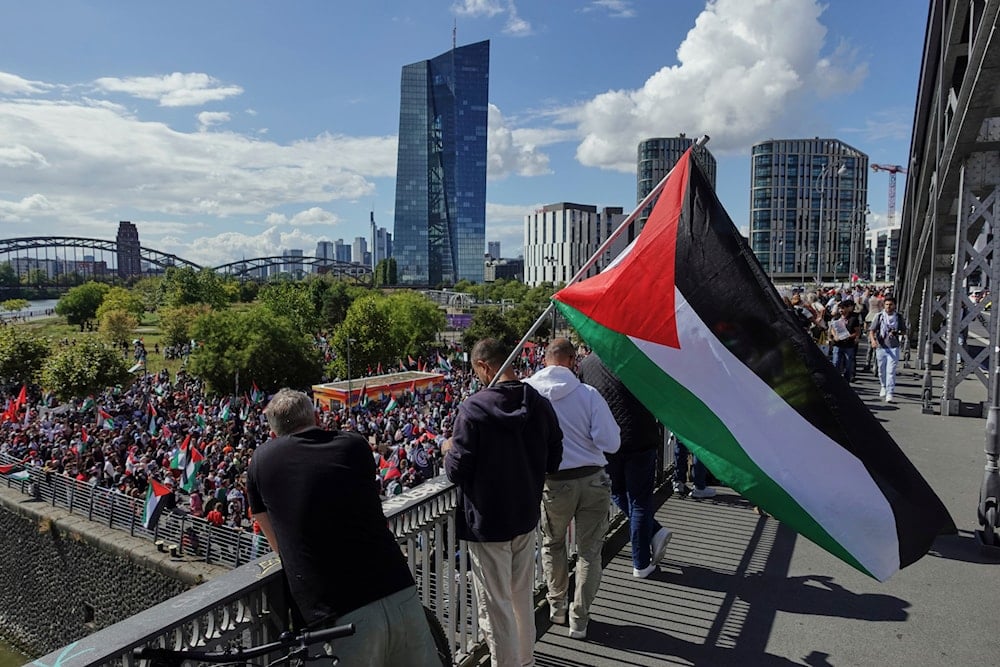Left party urges Germany to end crackdown on pro-Palestine activism
Germany’s Left party calls for an end to repression of pro-Palestine activism, as UN experts warn of rising restrictions on peaceful solidarity movements.
-

Hundreds of people take part in a pro-Palestine demonstration in Frankfurt, Germany, on August 30, 2025 (AP)
Germany’s opposition party, The Left (Die Linke), urged the government on Saturday to end what it sees as a crackdown on pro-Palestine activism in the country, saying restrictions on solidarity movements have intensified since last year.
Speaking at a state party congress in Berlin, party chairwoman Ines Schwerdtner said the repression against pro-Palestine movements must end, stressing that Palestinian self-determination and Jewish self-determination remain inseparable. "The repression against pro-Palestinian movements must end. Palestinian self-determination can only go hand in hand with Jewish self-determination in Israel and Palestine, and vice versa," Schwerdtner said, calling on her party to stand up more firmly for Palestinian rights.
Her comments come amid growing criticism of Germany’s approach to pro-Palestine demonstrations since October 2023, as authorities have intensified policing and imposed restrictions on public gatherings expressing solidarity with Gaza. Rights advocates argue that Berlin’s measures unfairly target Palestinian communities and supporters.
Germany suppressing pro-Palestine voices
UN experts have raised similar concerns. Last month, they warned that Germany has increasingly suppressed peaceful pro-Palestine demonstrations and punished legitimate activism, which includes calls to halt arms exports to “Israel", end the genocide in Gaza, ensure humanitarian access, recognize the State of Palestine, and pursue accountability for international crimes.
The experts noted that most demonstrations have remained peaceful, despite widespread crackdowns, arrests, and bans targeting protesters. They stressed that solidarity activism should not be criminalized, especially when the demands fall within the scope of international law and human rights advocacy.
Advocates in Germany say that defending the right to protest is essential as Palestinians continue to face war, occupation, and worsening humanitarian conditions. Supporters believe that protecting free expression is directly linked to Germany’s responsibility toward global justice, including the situation in Gaza.
Germany disregards genocide for 'anti-semitism' advocacy
Germany has waged a sustained political‑policing campaign against the pro‑Palestine movement since October 2023, combining blanket protest bans, criminalization of slogans, raids, and residency threats under the banner of “fighting antisemitism". This escalation rests on a longer trajectory of using the IHRA definition of antisemitism and anti‑BDS policies to fuse anti‑Zionism with actual anti-Semitism, turning criticism of “Israel” into a security issue and justifying an exceptional regime of repression.
Within days of Operation Al‑Aqsa Flood, authorities in Berlin and other cities moved to pre‑empt or outright ban Palestinian solidarity rallies, leading to repeated prohibitions, arrests, and aggressive street policing. Former Chancellor Olaf Scholz announced the move to outlaw the Palestinian prisoners’ solidarity network Samidoun and framed the use of Germany’s association law as a “powerful instrument” against groups celebrating or even defending Palestinian resistance, signaling that organizational infrastructure itself would be targeted.
Police state for Palestinian activism
In parallel, police were empowered to disperse demonstrations, seize flags and signs, and detain activists on the vaguest accusations of “glorifying violence” or “antisemitic incitement”, collapsing support for Palestinian rights into a domestic extremism category.
By 2024, Germany will have effectively become a police state for Palestine activism, with night‑time house raids, home detentions, and systematic disruption of public events, including conferences and academic or cultural gatherings. Police interventions at a pro‑Palestine congress in Berlin and at various Palestine‑related talks underscored that the red lines had shifted from “security” to suppressing almost any visible, organized criticism of “Israel".
The overall picture from late 2023 to 2025 is of a state that has progressively subordinated civil liberties, assembly, speech, and academic freedom to a rigid pro‑“Israel” consensus, making Germany a cautionary example of how historical memory and anti‑racism discourse can be instrumentalized against a contemporary anti‑colonial movement.

 4 Min Read
4 Min Read











